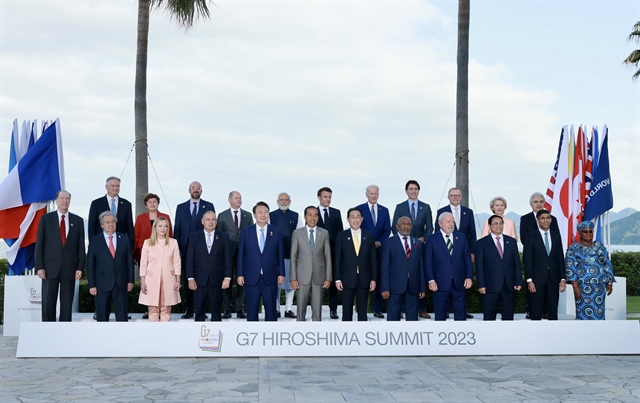 Politics & Law
Politics & Law

 |
| Heads of delegations of countries participating in the G7 Hiroshima Summit. — VNA/VNS Photo Dương Giang |
HIROSHIMA — On Saturday, Prime Minister Phạm Minh Chính emphasised the importance of a global approach, multilateralism, self-reliance of every country, and extensive international cooperation to realise sustainable development, climate change responses, emission reduction and energy transition.
Attending the second session of the expanded Summit of the Group of Seven (G7) in Hiroshima, Japan, PM Chính raised Việt Nam’s point of view on ensuring fairness and reasonableness, taking into account the different conditions and levels between countries, ensuring a strategic balance between clean energy transition and global energy security, and developing fair, diversified, highly practical energy transition roadmaps in line with market rules.
Chính emphasised that human resources, science, technology, and innovation are the central driving force for the sustainable development of all countries, the key to solving the issue of ensuring both rapid and sustainable growth.
He proposed that G7 countries and international organisations strengthen support for developing countries in technology transfer, capacity building in institutions, infrastructure, human resources, governance methods, and an ecosystem for clean energy development.
PM Chính said that the effective mobilisation and use of resources is the key factor for sustainable development. G7 countries should prioritise the timely and effective implementation of financial commitments for development, meeting the urgent requirements of debt relief, relaxation, and restructuring for poor countries.
The Vietnamese PM suggested that it is necessary to take a creative approach to mobilise diverse financial sources, focusing on public-private partnership (PPP), mixed finance associated with private sector participation, and foreign investment.
As for Việt Nam, he affirmed the country’s determination to achieve the goal of bringing net emissions to zero by 2050, even though Việt Nam is still a developing country in transition and experiencing difficulties due to wars.
The Vietnamese Government leader emphasised his support for Japan's Asia Zero Emission Community (AZEC) initiative and suggested that G7 countries and partners continue to accompany Việt Nam in implementing the Just Energy Transition Partnership (JETP) agreement. He also suggested contributing to helping Việt Nam promote its potential and advantages, become a regional renewable energy centre, and deeply participate in supporting industrial production chains in clean energy and circular economy.
He also announced Việt Nam’s National Power Development Plan for 2021-2030 with a vision to 2050, with priority to renewable energy development.
Chính said he hopes Việt Nam will continue to receive support and effective cooperation in the management and sustainable use of water resources, improving capacity to respond to climate change and sea level rise, especially in its Mekong Delta, as well as supporting the sustainable development of the Mekong Sub-region.
At the meeting, many leaders agreed with Việt Nam on the importance of international solidarity and cooperation in responding to global challenges, emphasising the need to quickly make up the shortfall in finance for climate change adaptation. They also supported Việt Nam’s view on balancing the implementation of the net zero emissions target with ensuring energy security.
Many countries emphasise that the energy transition can be carried out with many different routes suitable to the circumstances and conditions of each country. G7 countries affirmed their determination to implement new initiatives such as JETP, Green Climate Fund, and Global Infrastructure and Investment Partnership (PGII).
Developing countries proposed to promote cooperation in technology transfer, concessional financing, technical assistance, and implementation of the commitment of US$100 billion for climate finance of developed countries.
Many countries also suggested promoting diversification of the supply chain, ensuring the supply of essentials for clean energy development.
Within the framework of the session, PM Chính attended the event on the PGII Initiative – an important initiative of the G7 group in promoting high-quality infrastructure investment in developing countries through public finance mobilisation and the public-private partnership. — VNS




